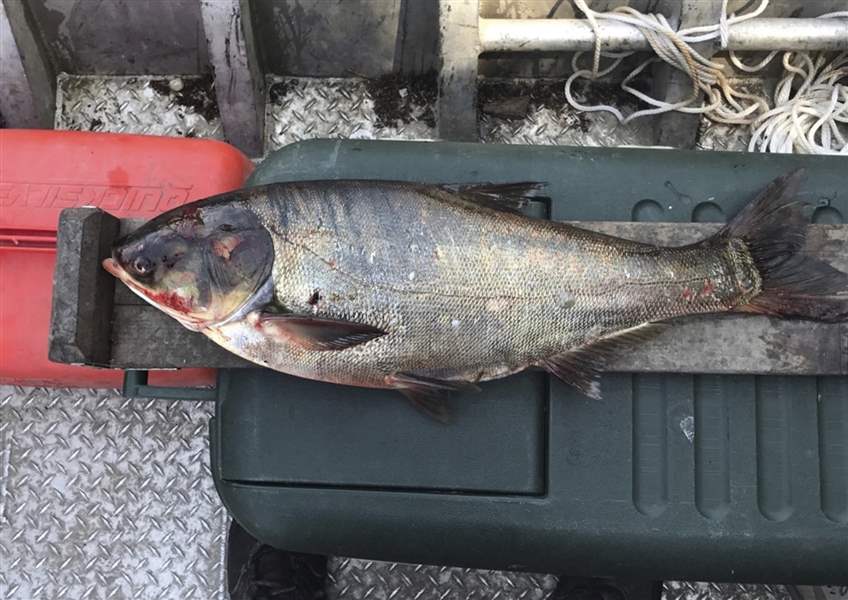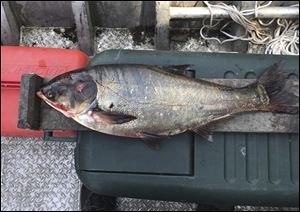
Congressmen demand faster action on Asian carp
12/11/2017
A silver carp that was caught in the Illinois Waterway below T.J. O'Brien Lock and Dam, approximately nine miles away from Lake Michigan. Twenty-six members of Congress joined the push last week to demand more aggressive action from the Army Corps of Engineers against destructive Asian carp in the Great Lakes.
ASSOCIATED PRESS

A silver carp that was caught in the Illinois Waterway below T.J. O'Brien Lock and Dam, approximately nine miles away from Lake Michigan. Twenty-six members of Congress joined the push last week to demand more aggressive action from the Army Corps of Engineers against destructive Asian carp in the Great Lakes.
Twenty-six members of Congress — including U.S. Reps. Marcy Kaptur (D., Toledo), Bob Latta (R., Bowling Green), Tim Walberg (R., Tipton), and Debbie Dingell (D., Dearborn) — have joined numerous other elected officials in demanding more aggressive action from the Army Corps of Engineers against destructive Asian carp threatening to enter the Great Lakes near Chicago.
A bipartisan letter submitted Friday said the congressmen are firmly holding the Corps to an early 2019 deadline for completing the most crucial report to date for a long-term fix, called the Brandon Road Lock & Dam Study.
It affects the future of the Brandon Road lock near Joliet, Ill., and the series of Chicago-area waterways that artificially connect the Mississippi River and Great Lakes basins. That connection, made in the early 1900s, has made it possible for invasive carp moving north along the Mississippi to someday enter the Great Lakes via Lake Michigan.
RELATED CONTENT: DeWine calls for tougher action to stop Asian carp
The letter, submitted on the final day the Corps was accepting formal comments to its tentatively selected plan, mirrors one submitted earlier by several U.S. senators from the Great Lakes area, including Rob Portman (R., Ohio) and Debbie Stabenow (D., Mich.), co-chairs of the Senate Great Lakes Task Force, and U.S. Sen. Sherrod Brown (D., Ohio), U.S. Sen. Gary Peters (D., Mich.), and senators from Minnesota, Wisconsin, Illinois, and New York who are members of that task force.
“Current estimates show it will take as long as eight years to have a barrier installed at the Brandon Road Lock and Dam — a time frame which is unacceptable,” Miss Kaptur said. “With the Asian carp on the doorstep of our region’s most vital natural resource, we have a small window of opportunity to stop this invasive species. Once the Asian carp are in the Great Lakes, it will be too late to stop the destruction they will cause.”

Kaptur
The Corps is looking at fortifying electric barriers and taking other measures to thwart the movement of carp and other exotics. But it has said it is unlikely to act on several measures before 2025, a timeline that senators and now congressmen have said is unacceptable.
Ohio Attorney General Mike DeWine, a 2018 gubernatorial candidate, likewise joined the fray late last week by telling the Corps in his formal comments that it should close the Brandon Road lock while also recognizing its obligation to meet previously agreed-upon deadlines.
While the Corps has tentatively selected a plan that uses electrical fences, noise, and water jets to keep out invasive species, Mr. DeWine and the large contingent of congressional members believe that doesn’t go far enough — especially after reports in June of a silver Asian carp found 9 miles from Lake Michigan, beyond the electric barriers.
The attorney general said the Corps should implement the lock closure alternative, which will be the most effective and cheapest to construct.
The Chicago-area decision affects Ohio because Lake Erie is the epicenter of the Great Lakes region’s $7 billion fishery, valued at more than all commercial and recreational fishing in U.S. waters along the Atlantic and Pacific oceans and the Gulf of Mexico.

Latta
More fish are spawned and caught in Lake Erie than the other four Great Lakes combined.
Researchers have said Ohio’s tourism and recreation industries would greatly suffer if Asian carp found their way to western Lake Erie.
Mr. DeWine also encouraged the Corps to work on plans for a multibillion-dollar, complete hydrologic separation of the Mississippi River and Great Lakes basins to block the spread of Asian carp.
A contingent of five major environmental groups — the Alliance for the Great Lakes, the Environmental Law & Policy Center, the Natural Resources Defense Council, Prairie Rivers Network, and the Illinois chapter of the Sierra Club — also demanded a more aggressive response from the Corps via 21 pages of joint comments submitted Friday.
“Now is the time for all effective and necessary action steps,” Howard Learner, executive director of the Chicago-based Environmental Law & Policy Center, said. “Further delays risk Asian carp getting into Lake Michigan while the Army Corps is fiddling. Prevention solutions now are wise investments.”
Contact Tom Henry at thenry@theblade.com, 419-724-6079, or via Twitter @ecowriterohio.